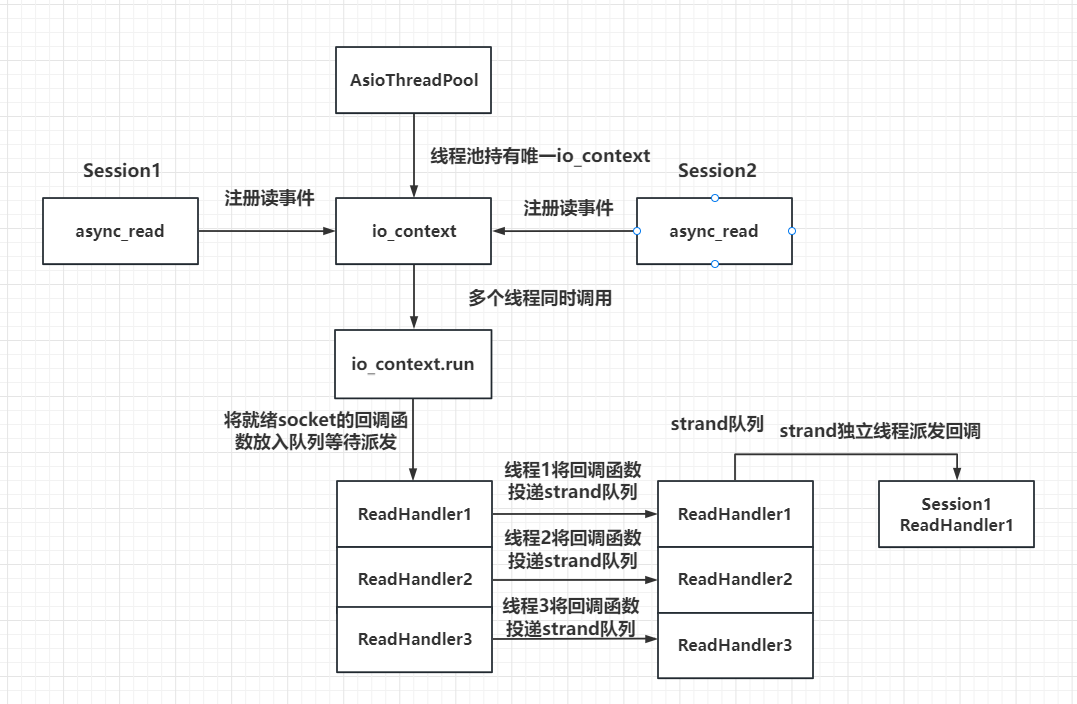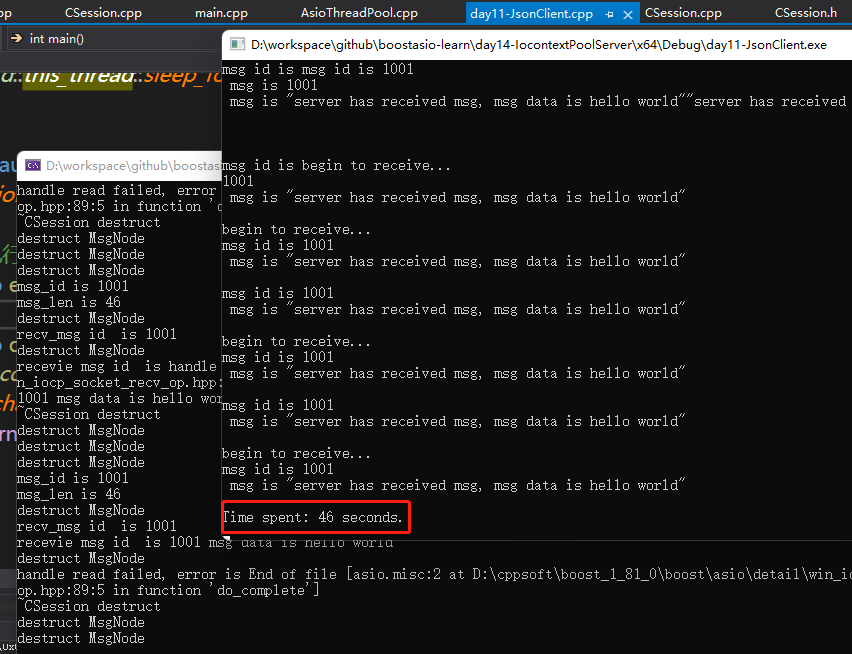今天给大家介绍asio多线程模式的第二种,之前我们介绍了IOServicePool的方式,一个IOServicePool开启n个线程和n个iocontext,每个线程内独立运行iocontext, 各个iocontext监听各自绑定的socket是否就绪,如果就绪就在各自线程里触发回调函数。为避免线程安全问题,我们将网络数据封装为逻辑包投递给逻辑系统,逻辑系统有一个单独线程处理,这样将网络IO和逻辑处理解耦合,极大的提高了服务器IO层面的吞吐率。这一次介绍的另一种多线程模式IOThreadPool,我们只初始化一个iocontext用来监听服务器的读写事件,包括新连接到来的监听也用这个iocontext。只是我们让iocontext.run在多个线程中调用,这样回调函数就会被不同的线程触发,从这个角度看回调函数被并发调用了。
结构图
线程池模式的多线程模型调度结构图,如下:

其中代码如下:
const.h
#pragma once #define MAX_LENGTH 1024*2 //头部总长度 #define HEAD_TOTAL_LEN 4 //头部id长度 #define HEAD_ID_LEN 2 //头部数据长度 #define HEAD_DATA_LEN 2 #define MAX_RECVQUE 10000 #define MAX_SENDQUE 1000 enum MSG_IDS { MSG_HELLO_WORD = 1001 };
Singleton.h
#pragma once #include <memory> #include <mutex> #include <iostream> using namespace std; template <typename T> class Singleton { protected: Singleton() = default; Singleton(const Singleton<T>&) = delete; Singleton& operator=(const Singleton<T>& st) = delete; static std::shared_ptr<T> _instance; public: static std::shared_ptr<T> GetInstance() { static std::once_flag s_flag; std::call_once(s_flag, [&]() { _instance = shared_ptr<T>(new T); }); return _instance; } void PrintAddress() { std::cout << _instance.get() << endl; } ~Singleton() { std::cout << "this is singleton destruct" << std::endl; } }; template <typename T> std::shared_ptr<T> Singleton<T>::_instance = nullptr;
MsgNode.h
#pragma once #include <string> #include "const.h" #include <iostream> #include <boost/asio.hpp> using namespace std; using boost::asio::ip::tcp; class LogicSystem; class MsgNode { public: MsgNode(short max_len) :_total_len(max_len), _cur_len(0) { _data = new char[_total_len + 1](); _data[_total_len] = '\0'; } ~MsgNode() { std::cout << "destruct MsgNode" << endl; delete[] _data; } void Clear() { ::memset(_data, 0, _total_len); _cur_len = 0; } short _cur_len; short _total_len; char* _data; }; class RecvNode :public MsgNode { friend class LogicSystem; public: RecvNode(short max_len, short msg_id); private: short _msg_id; }; class SendNode:public MsgNode { friend class LogicSystem; public: SendNode(const char* msg,short max_len, short msg_id); private: short _msg_id; };
MsgNode.cpp
#include "MsgNode.h" RecvNode::RecvNode(short max_len, short msg_id):MsgNode(max_len), _msg_id(msg_id){ } SendNode::SendNode(const char* msg, short max_len, short msg_id):MsgNode(max_len + HEAD_TOTAL_LEN) , _msg_id(msg_id){ //先发送id, 转为网络字节序 short msg_id_host = boost::asio::detail::socket_ops::host_to_network_short(msg_id); memcpy(_data, &msg_id_host, HEAD_ID_LEN); //转为网络字节序 short max_len_host = boost::asio::detail::socket_ops::host_to_network_short(max_len); memcpy(_data + HEAD_ID_LEN, &max_len_host, HEAD_DATA_LEN); memcpy(_data + HEAD_ID_LEN + HEAD_DATA_LEN, msg, max_len); }
LogicSystem.h
#pragma once #include "Singleton.h" #include <queue> #include <thread> #include "CSession.h" #include <queue> #include <map> #include <functional> #include "const.h" #include <json/json.h> #include <json/value.h> #include <json/reader.h> typedef function<void(shared_ptr<CSession>, const short &msg_id, const string &msg_data)> FunCallBack; class LogicSystem:public Singleton<LogicSystem> { friend class Singleton<LogicSystem>; public: ~LogicSystem(); void PostMsgToQue(shared_ptr < LogicNode> msg); private: LogicSystem(); void DealMsg(); void RegisterCallBacks(); void HelloWordCallBack(shared_ptr<CSession>, const short &msg_id, const string &msg_data); std::thread _worker_thread; std::queue<shared_ptr<LogicNode>> _msg_que; std::mutex _mutex; std::condition_variable _consume; bool _b_stop; std::map<short, FunCallBack> _fun_callbacks; };
LogicSystem.cpp
#include "LogicSystem.h" using namespace std; LogicSystem::LogicSystem():_b_stop(false){ RegisterCallBacks(); _worker_thread = std::thread (&LogicSystem::DealMsg, this); } LogicSystem::~LogicSystem(){ _b_stop = true; _consume.notify_one(); _worker_thread.join(); } void LogicSystem::PostMsgToQue(shared_ptr < LogicNode> msg) { std::unique_lock<std::mutex> unique_lk(_mutex); _msg_que.push(msg); //由0变为1则发送通知信号 if (_msg_que.size() == 1) { unique_lk.unlock(); _consume.notify_one(); } } void LogicSystem::DealMsg() { for (;;) { std::unique_lock<std::mutex> unique_lk(_mutex); //判断队列为空则用条件变量阻塞等待,并释放锁 while (_msg_que.empty() && !_b_stop) { _consume.wait(unique_lk); } //判断是否为关闭状态,把所有逻辑执行完后则退出循环 if (_b_stop ) { while (!_msg_que.empty()) { auto msg_node = _msg_que.front(); cout << "recv_msg id is " << msg_node->_recvnode->_msg_id << endl; auto call_back_iter = _fun_callbacks.find(msg_node->_recvnode->_msg_id); if (call_back_iter == _fun_callbacks.end()) { _msg_que.pop(); continue; } call_back_iter->second(msg_node->_session, msg_node->_recvnode->_msg_id, std::string(msg_node->_recvnode->_data, msg_node->_recvnode->_cur_len)); _msg_que.pop(); } break; } //如果没有停服,且说明队列中有数据 auto msg_node = _msg_que.front(); cout << "recv_msg id is " << msg_node->_recvnode->_msg_id << endl; auto call_back_iter = _fun_callbacks.find(msg_node->_recvnode->_msg_id); if (call_back_iter == _fun_callbacks.end()) { _msg_que.pop(); continue; } call_back_iter->second(msg_node->_session, msg_node->_recvnode->_msg_id, std::string(msg_node->_recvnode->_data, msg_node->_recvnode->_cur_len)); _msg_que.pop(); } } void LogicSystem::RegisterCallBacks() { _fun_callbacks[MSG_HELLO_WORD] = std::bind(&LogicSystem::HelloWordCallBack, this, placeholders::_1, placeholders::_2, placeholders::_3); } void LogicSystem::HelloWordCallBack(shared_ptr<CSession> session, const short &msg_id, const string &msg_data) { Json::Reader reader; Json::Value root; reader.parse(msg_data, root); std::cout << "recevie msg id is " << root["id"].asInt() << " msg data is " << root["data"].asString() << endl; root["data"] = "server has received msg, msg data is " + root["data"].asString(); std::string return_str = root.toStyledString(); session->Send(return_str, root["id"].asInt()); }
对于多线程触发回调函数的情况,我们可以利用asio提供的串行类strand封装一下,这样就可以被串行调用了,其基本原理就是在线程各自调用函数时取消了直接调用的方式,而是利用一个strand类型的对象将要调用的函数投递到strand管理的队列中,再由一个统一的线程调用回调函数,调用是串行的,解决了线程并发带来的安全问题。

CSession.h
#pragma once #include <boost/asio.hpp> #include <boost/uuid/uuid_io.hpp> #include <boost/uuid/uuid_generators.hpp> #include <queue> #include <mutex> #include <memory> #include "const.h" #include "MsgNode.h" using namespace std; using boost::asio::ip::tcp; class CServer; class LogicSystem; using boost::asio::strand; using boost::asio::io_context; class CSession: public std::enable_shared_from_this<CSession> { public: CSession(boost::asio::io_context& io_context, CServer* server); ~CSession(); tcp::socket& GetSocket(); std::string& GetUuid(); void Start(); void Send(char* msg, short max_length, short msgid); void Send(std::string msg, short msgid); void Close(); std::shared_ptr<CSession> SharedSelf(); private: void HandleRead(const boost::system::error_code& error, size_t bytes_transferred, std::shared_ptr<CSession> shared_self); void HandleWrite(const boost::system::error_code& error, std::shared_ptr<CSession> shared_self); tcp::socket _socket; std::string _uuid; char _data[MAX_LENGTH]; CServer* _server; bool _b_close; std::queue<shared_ptr<SendNode> > _send_que; std::mutex _send_lock; //收到的消息结构 std::shared_ptr<RecvNode> _recv_msg_node; bool _b_head_parse; //收到的头部结构 std::shared_ptr<MsgNode> _recv_head_node; strand<io_context::executor_type> _strand; }; class LogicNode { friend class LogicSystem; public: LogicNode(shared_ptr<CSession>, shared_ptr<RecvNode>); private: shared_ptr<CSession> _session; shared_ptr<RecvNode> _recvnode; };
CSession.cpp
#include "CSession.h" #include "CServer.h" #include <iostream> #include <sstream> #include <json/json.h> #include <json/value.h> #include <json/reader.h> #include "LogicSystem.h" CSession::CSession(boost::asio::io_context& io_context, CServer* server): _socket(io_context), _server(server), _b_close(false), _b_head_parse(false), _strand(io_context.get_executor()){ boost::uuids::uuid a_uuid = boost::uuids::random_generator()(); _uuid = boost::uuids::to_string(a_uuid); _recv_head_node = make_shared<MsgNode>(HEAD_TOTAL_LEN); } CSession::~CSession() { std::cout << "~CSession destruct" << endl; } tcp::socket& CSession::GetSocket() { return _socket; } std::string& CSession::GetUuid() { return _uuid; } void CSession::Start(){ ::memset(_data, 0, MAX_LENGTH); _socket.async_read_some(boost::asio::buffer(_data, MAX_LENGTH), boost::asio::bind_executor(_strand, std::bind(&CSession::HandleRead, this, std::placeholders::_1, std::placeholders::_2, SharedSelf()))); } void CSession::Send(std::string msg, short msgid) { std::lock_guard<std::mutex> lock(_send_lock); int send_que_size = _send_que.size(); if (send_que_size > MAX_SENDQUE) { std::cout << "session: " << _uuid << " send que fulled, size is " << MAX_SENDQUE << endl; return; } _send_que.push(make_shared<SendNode>(msg.c_str(), msg.length(), msgid)); if (send_que_size > 0) { return; } auto& msgnode = _send_que.front(); boost::asio::async_write(_socket, boost::asio::buffer(msgnode->_data, msgnode->_total_len), boost::asio::bind_executor(_strand,std::bind(&CSession::HandleWrite, this, std::placeholders::_1, SharedSelf())) ); } void CSession::Send(char* msg, short max_length, short msgid) { std::lock_guard<std::mutex> lock(_send_lock); int send_que_size = _send_que.size(); if (send_que_size > MAX_SENDQUE) { std::cout << "session: " << _uuid << " send que fulled, size is " << MAX_SENDQUE << endl; return; } _send_que.push(make_shared<SendNode>(msg, max_length, msgid)); if (send_que_size>0) { return; } auto& msgnode = _send_que.front(); boost::asio::async_write(_socket, boost::asio::buffer(msgnode->_data, msgnode->_total_len), boost::asio::bind_executor(_strand, std::bind(&CSession::HandleWrite, this, std::placeholders::_1, SharedSelf())) ); } void CSession::Close() { _socket.close(); _b_close = true; } std::shared_ptr<CSession>CSession::SharedSelf() { return shared_from_this(); } void CSession::HandleWrite(const boost::system::error_code& error, std::shared_ptr<CSession> shared_self) { //增加异常处理 try { if (!error) { std::lock_guard<std::mutex> lock(_send_lock); //cout << "send data " << _send_que.front()->_data+HEAD_LENGTH << endl; _send_que.pop(); if (!_send_que.empty()) { auto& msgnode = _send_que.front(); boost::asio::async_write(_socket, boost::asio::buffer(msgnode->_data, msgnode->_total_len), boost::asio::bind_executor(_strand, std::bind(&CSession::HandleWrite, this, std::placeholders::_1, shared_self)) ); } } else { std::cout << "handle write failed, error is " << error.what() << endl; Close(); _server->ClearSession(_uuid); } } catch (std::exception& e) { std::cerr << "Exception code : " << e.what() << endl; } } void CSession::HandleRead(const boost::system::error_code& error, size_t bytes_transferred, std::shared_ptr<CSession> shared_self){ try { if (!error) { //已经移动的字符数 int copy_len = 0; while (bytes_transferred > 0) { if (!_b_head_parse) { //收到的数据不足头部大小 if (bytes_transferred + _recv_head_node->_cur_len < HEAD_TOTAL_LEN) { memcpy(_recv_head_node->_data + _recv_head_node->_cur_len, _data + copy_len, bytes_transferred); _recv_head_node->_cur_len += bytes_transferred; ::memset(_data, 0, MAX_LENGTH); _socket.async_read_some(boost::asio::buffer(_data, MAX_LENGTH), boost::asio::bind_executor(_strand, std::bind(&CSession::HandleRead, this, std::placeholders::_1, std::placeholders::_2, shared_self)) ); return; } //收到的数据比头部多 //头部剩余未复制的长度 int head_remain = HEAD_TOTAL_LEN - _recv_head_node->_cur_len; memcpy(_recv_head_node->_data + _recv_head_node->_cur_len, _data + copy_len, head_remain); //更新已处理的data长度和剩余未处理的长度 copy_len += head_remain; bytes_transferred -= head_remain; //获取头部MSGID数据 short msg_id = 0; memcpy(&msg_id, _recv_head_node->_data, HEAD_ID_LEN); //网络字节序转化为本地字节序 msg_id = boost::asio::detail::socket_ops::network_to_host_short(msg_id); std::cout << "msg_id is " << msg_id << endl; //id非法 if (msg_id > MAX_LENGTH) { std::cout << "invalid msg_id is " << msg_id << endl; _server->ClearSession(_uuid); return; } short msg_len = 0; memcpy(&msg_len, _recv_head_node->_data+HEAD_ID_LEN, HEAD_DATA_LEN); //网络字节序转化为本地字节序 msg_len = boost::asio::detail::socket_ops::network_to_host_short(msg_len); std::cout << "msg_len is " << msg_len << endl; //id非法 if (msg_len > MAX_LENGTH) { std::cout << "invalid data length is " << msg_len << endl; _server->ClearSession(_uuid); return; } _recv_msg_node = make_shared<RecvNode>(msg_len, msg_id); //消息的长度小于头部规定的长度,说明数据未收全,则先将部分消息放到接收节点里 if (bytes_transferred < msg_len) { memcpy(_recv_msg_node->_data + _recv_msg_node->_cur_len, _data + copy_len, bytes_transferred); _recv_msg_node->_cur_len += bytes_transferred; ::memset(_data, 0, MAX_LENGTH); _socket.async_read_some(boost::asio::buffer(_data, MAX_LENGTH), boost::asio::bind_executor(_strand, std::bind(&CSession::HandleRead, this, std::placeholders::_1, std::placeholders::_2, shared_self)) ); //头部处理完成 _b_head_parse = true; return; } memcpy(_recv_msg_node->_data + _recv_msg_node->_cur_len, _data + copy_len, msg_len); _recv_msg_node->_cur_len += msg_len; copy_len += msg_len; bytes_transferred -= msg_len; _recv_msg_node->_data[_recv_msg_node->_total_len] = '\0'; //cout << "receive data is " << _recv_msg_node->_data << endl; //此处将消息投递到逻辑队列中 LogicSystem::GetInstance()->PostMsgToQue(make_shared<LogicNode>(shared_from_this(), _recv_msg_node)); //继续轮询剩余未处理数据 _b_head_parse = false; _recv_head_node->Clear(); if (bytes_transferred <= 0) { ::memset(_data, 0, MAX_LENGTH); _socket.async_read_some(boost::asio::buffer(_data, MAX_LENGTH), boost::asio::bind_executor(_strand, std::bind(&CSession::HandleRead, this, std::placeholders::_1, std::placeholders::_2, shared_self)) ); return; } continue; } //已经处理完头部,处理上次未接受完的消息数据 //接收的数据仍不足剩余未处理的 int remain_msg = _recv_msg_node->_total_len - _recv_msg_node->_cur_len; if (bytes_transferred < remain_msg) { memcpy(_recv_msg_node->_data + _recv_msg_node->_cur_len, _data + copy_len, bytes_transferred); _recv_msg_node->_cur_len += bytes_transferred; ::memset(_data, 0, MAX_LENGTH); _socket.async_read_some(boost::asio::buffer(_data, MAX_LENGTH), boost::asio::bind_executor(_strand, std::bind(&CSession::HandleRead, this, std::placeholders::_1, std::placeholders::_2, shared_self)) ); return; } memcpy(_recv_msg_node->_data + _recv_msg_node->_cur_len, _data + copy_len, remain_msg); _recv_msg_node->_cur_len += remain_msg; bytes_transferred -= remain_msg; copy_len += remain_msg; _recv_msg_node->_data[_recv_msg_node->_total_len] = '\0'; //cout << "receive data is " << _recv_msg_node->_data << endl; //此处将消息投递到逻辑队列中 LogicSystem::GetInstance()->PostMsgToQue(make_shared<LogicNode>(shared_from_this(), _recv_msg_node)); //继续轮询剩余未处理数据 _b_head_parse = false; _recv_head_node->Clear(); if (bytes_transferred <= 0) { ::memset(_data, 0, MAX_LENGTH); _socket.async_read_some(boost::asio::buffer(_data, MAX_LENGTH), boost::asio::bind_executor(_strand, std::bind(&CSession::HandleRead, this, std::placeholders::_1, std::placeholders::_2, shared_self)) ); return; } continue; } } else { std::cout << "handle read failed, error is " << error.what() << endl; Close(); _server->ClearSession(_uuid); } } catch (std::exception& e) { std::cout << "Exception code is " << e.what() << endl; } } LogicNode::LogicNode(shared_ptr<CSession> session, shared_ptr<RecvNode> recvnode):_session(session),_recvnode(recvnode) { }
CServer.h
#pragma once #include <boost/asio.hpp> #include "CSession.h" #include <memory.h> #include <map> #include <mutex> using namespace std; using boost::asio::ip::tcp; class CServer { public: CServer(boost::asio::io_context& io_context, short port); ~CServer(); void ClearSession(std::string); private: void HandleAccept(shared_ptr<CSession>, const boost::system::error_code & error); void StartAccept(); boost::asio::io_context &_io_context; short _port; tcp::acceptor _acceptor; std::map<std::string, shared_ptr<CSession>> _sessions; std::mutex _mutex; boost::asio::executor_work_guard<boost::asio::io_context::executor_type> work_guard_; };
CServer.cpp
#include "CServer.h" #include <iostream> #include "AsioThreadPool.h" CServer::CServer(boost::asio::io_context& io_context, short port):_io_context(io_context), _port(port), _acceptor(io_context, tcp::endpoint(tcp::v4(),port)), work_guard_(boost::asio::make_work_guard(io_context)) { cout << "Server start success, listen on port : " << _port << endl; StartAccept(); } CServer::~CServer() { cout << "Server destruct listen on port : " << _port << endl; } void CServer::HandleAccept(shared_ptr<CSession> new_session, const boost::system::error_code& error){ if (!error) { new_session->Start(); lock_guard<mutex> lock(_mutex); _sessions.insert(make_pair(new_session->GetUuid(), new_session)); } else { cout << "session accept failed, error is " << error.what() << endl; } StartAccept(); } void CServer::StartAccept() { shared_ptr<CSession> new_session = make_shared<CSession>(_io_context, this); _acceptor.async_accept(new_session->GetSocket(), std::bind(&CServer::HandleAccept, this, new_session, std::placeholders::_1)); } void CServer::ClearSession(std::string uuid) { lock_guard<mutex> lock(_mutex); _sessions.erase(uuid); }
AsioThreadPool.h
#pragma once #include <boost/asio.hpp> #include "Singleton.h" class AsioThreadPool:public Singleton<AsioThreadPool> { public: friend class Singleton<AsioThreadPool>; ~AsioThreadPool(){} AsioThreadPool& operator=(const AsioThreadPool&) = delete; AsioThreadPool(const AsioThreadPool&) = delete; boost::asio::io_context& GetIOService(); void Stop(); private: AsioThreadPool(int threadNum = std::thread::hardware_concurrency()); boost::asio::io_context _service; std::unique_ptr<boost::asio::io_context::work> _work; std::vector<std::thread> _threads; };
AsioThreadPool.cpp
#include "AsioThreadPool.h" AsioThreadPool::AsioThreadPool(int threadNum ):_work(new boost::asio::io_context::work(_service)){ for (int i = 0; i < threadNum; ++i) { _threads.emplace_back([this]() { _service.run(); }); } } boost::asio::io_context& AsioThreadPool::GetIOService() { return _service; } void AsioThreadPool::Stop() { _service.stop(); _work.reset(); for (auto& t : _threads) { t.join(); } std::cout << "AsioThreadPool::Stop" << endl; }
main.cpp
#include <iostream> #include "CServer.h" #include "Singleton.h" #include "LogicSystem.h" #include <csignal> #include <thread> #include <mutex> #include "AsioThreadPool.h" using namespace std; int main() { try { auto pool = AsioThreadPool::GetInstance(); boost::asio::io_context io_context; boost::asio::signal_set signals(io_context, SIGINT, SIGTERM); signals.async_wait([pool,&io_context](auto, auto) { io_context.stop(); pool->Stop(); }); CServer s(pool->GetIOService(), 10086); //Æô¶¯¼àÌýÍ˳öµÄio_context io_context.run(); std::cout << "server exited ...." << std::endl; } catch (std::exception& e) { std::cerr << "Exception: " << e.what() << endl; } }
具体详情:
https://llfc.club/category?catid=225RaiVNI8pFDD5L4m807g7ZwmF#!aid/2R2LjXaJqlXvTqHLY4034ojk5pa
代码
https://gitee.com/secondtonone1/boostasio-learn/tree/master/network/day15-ThreadPoolServer
先实现IOThreadPool
#include<boost/asio.hpp>#include"Singleton.h"classAsioThreadPool:publicSingleton<AsioThreadPool>{public:friendclassSingleton<AsioThreadPool>;~AsioThreadPool(){}AsioThreadPool&operator=(constAsioThreadPool&)=delete;AsioThreadPool(constAsioThreadPool&)=delete;boost::asio::io_context&GetIOService();voidStop();private:AsioThreadPool(int threadNum = std::thread::hardware_concurrency());boost::asio::io_context _service;std::unique_ptr<boost::asio::io_context::work> _work;std::vector<std::thread> _threads;};
AsioThreadPool继承了Singleton<AsioThreadPool>,实现了一个函数GetIOService获取iocontext
接下来我们看看具体实现
#include"AsioThreadPool.h"AsioThreadPool::AsioThreadPool(int threadNum ):_work(new boost::asio::io_context::work(_service)){for(int i =0; i < threadNum;++i){_threads.emplace_back([this](){_service.run();});}}boost::asio::io_context&AsioThreadPool::GetIOService(){return _service;}voidAsioThreadPool::Stop(){_work.reset();for(auto& t : _threads){t.join();}}
构造函数中实现了一个线程池,线程池里每个线程都会运行_service.run函数,_service.run函数内部就是从iocp或者epoll获取就绪描述符和绑定的回调函数,进而调用回调函数,因为回调函数是在不同的线程里调用的,所以会存在不同的线程调用同一个socket的回调函数的情况。_service.run 内部在Linux环境下调用的是epoll_wait返回所有就绪的描述符列表,在windows上会循环调用GetQueuedCompletionStatus函数返回就绪的描述符,二者原理类似,进而通过描述符找到对应的注册的回调函数,然后调用回调函数。
比如iocp的流程是这样的
IOCP的使用主要分为以下几步:1创建完成端口(iocp)对象2创建一个或多个工作线程,在完成端口上执行并处理投递到完成端口上的I/O请求3Socket关联iocp对象,在Socket上投递网络事件4工作线程调用GetQueuedCompletionStatus函数获取完成通知封包,取得事件信息并进行处理
epoll的流程是这样的
1调用epoll_creat在内核中创建一张epoll表2开辟一片包含n个epoll_event大小的连续空间3将要监听的socket注册到epoll表里4调用epoll_wait,传入之前我们开辟的连续空间,epoll_wait返回就绪的epoll_event列表,epoll会将就绪的socket信息写入我们之前开辟的连续空间
隐患
IOThreadPool模式有一个隐患,同一个socket的就绪后,触发的回调函数可能在不同的线程里,比如第一次是在线程1,第二次是在线程3,如果这两次触发间隔时间不大,那么很可能出现不同线程并发访问数据的情况,比如在处理读事件时,第一次回调触发后我们从socket的接收缓冲区读数据出来,第二次回调触发,还是从socket的接收缓冲区读数据,就会造成两个线程同时从socket中读数据的情况,会造成数据混乱。
利用strand改进
对于多线程触发回调函数的情况,我们可以利用asio提供的串行类strand封装一下,这样就可以被串行调用了,其基本原理就是在线程各自调用函数时取消了直接调用的方式,而是利用一个strand类型的对象将要调用的函数投递到strand管理的队列中,再由一个统一的线程调用回调函数,调用是串行的,解决了线程并发带来的安全问题。

图中当socket就绪后并不是由多个线程调用每个socket注册的回调函数,而是将回调函数投递给strand管理的队列,再由strand统一调度派发。
为了让回调函数被派发到strand的队列,我们只需要在注册回调函数时加一层strand的包装即可。
在CSession类中添加一个成员变量
strand<io_context::executor_type> _strand;
CSession的构造函数
CSession::CSession(boost::asio::io_context& io_context,CServer* server):_socket(io_context), _server(server), _b_close(false),_b_head_parse(false), _strand(io_context.get_executor()){boost::uuids::uuid a_uuid = boost::uuids::random_generator()();_uuid = boost::uuids::to_string(a_uuid);_recv_head_node = make_shared<MsgNode>(HEAD_TOTAL_LEN);}
可以看到_strand的初始化是放在初始化列表里,利用io_context.get_executor()返回的执行器构造strand。
因为在asio中无论iocontext还是strand,底层都是通过executor调度的,我们将他理解为调度器就可以了,如果多个iocontext和strand的调度器是一个,那他们的消息派发统一由这个调度器执行。
我们利用iocontext的调度器构造strand,这样他们统一由一个调度器管理。在绑定回调函数的调度器时,我们选择strand绑定即可。
比如我们在Start函数里添加绑定 ,将回调函数的调用者绑定为_strand
voidCSession::Start(){::memset(_data,0, MAX_LENGTH);_socket.async_read_some(boost::asio::buffer(_data, MAX_LENGTH),boost::asio::bind_executor(_strand, std::bind(&CSession::HandleRead,this,std::placeholders::_1, std::placeholders::_2,SharedSelf())));}
同样的道理,在所有收发的地方,都将调度器绑定为_strand, 比如发送部分我们需要修改为如下
auto& msgnode = _send_que.front();boost::asio::async_write(_socket, boost::asio::buffer(msgnode->_data, msgnode->_total_len),boost::asio::bind_executor(_strand, std::bind(&CSession::HandleWrite,this, std::placeholders::_1,SharedSelf())));
回调函数的处理部分也做对应的修改即可。
性能对比
为了比较两种服务器多线程模式的性能,我们还是利用之前测试的客户端,客户端每隔10ms建立一个连接,总共建立100个连接,每个连接收发500次,总计10万个数据包,测试一下性能。
客户端测试代码如下
#include<iostream>#include<boost/asio.hpp>#include<thread>#include<json/json.h>#include<json/value.h>#include<json/reader.h>#include<chrono>usingnamespace std;usingnamespace boost::asio::ip;constint MAX_LENGTH =1024*2;constint HEAD_LENGTH =2;constint HEAD_TOTAL =4;std::vector<thread> vec_threads;int main(){auto start = std::chrono::high_resolution_clock::now();// 获取开始时间for(int i =0; i <100; i++){vec_threads.emplace_back([](){try{//创建上下文服务boost::asio::io_context ioc;//构造endpointtcp::endpoint remote_ep(address::from_string("127.0.0.1"),10086);tcp::socket sock(ioc);boost::system::error_code error = boost::asio::error::host_not_found;;sock.connect(remote_ep, error);if(error){cout <<"connect failed, code is "<< error.value()<<" error msg is "<< error.message();return0;}int i =0;while(i <500){Json::Value root;root["id"]=1001;root["data"]="hello world";std::string request = root.toStyledString();size_t request_length = request.length();char send_data[MAX_LENGTH]={0};int msgid =1001;int msgid_host = boost::asio::detail::socket_ops::host_to_network_short(msgid);memcpy(send_data,&msgid_host,2);//转为网络字节序int request_host_length = boost::asio::detail::socket_ops::host_to_network_short(request_length);memcpy(send_data +2,&request_host_length,2);memcpy(send_data +4, request.c_str(), request_length);boost::asio::write(sock, boost::asio::buffer(send_data, request_length +4));cout <<"begin to receive..."<< endl;char reply_head[HEAD_TOTAL];size_t reply_length = boost::asio::read(sock, boost::asio::buffer(reply_head, HEAD_TOTAL));msgid =0;memcpy(&msgid, reply_head, HEAD_LENGTH);short msglen =0;memcpy(&msglen, reply_head +2, HEAD_LENGTH);//转为本地字节序msglen = boost::asio::detail::socket_ops::network_to_host_short(msglen);msgid = boost::asio::detail::socket_ops::network_to_host_short(msgid);char msg[MAX_LENGTH]={0};size_t msg_length = boost::asio::read(sock, boost::asio::buffer(msg, msglen));Json::Reader reader;reader.parse(std::string(msg, msg_length), root);std::cout <<"msg id is "<< root["id"]<<" msg is "<< root["data"]<< endl;i++;}}catch(std::exception& e){std::cerr <<"Exception: "<< e.what()<< endl;}});std::this_thread::sleep_for(std::chrono::milliseconds(10));}for(auto& t : vec_threads){t.join();}// 执行一些需要计时的操作auto end = std::chrono::high_resolution_clock::now();// 获取结束时间auto duration = std::chrono::duration_cast<std::chrono::seconds>(end - start);// 计算时间差,单位为微秒std::cout <<"Time spent: "<< duration.count()<<" seconds."<< std::endl;// 输getchar();return0;}
我们先启动之前实现的AsioIOServicePool多线程模式的服务器测试,10万个数据包收发完成总计46秒

接下来我们启动ASIOThreadPool多线程模式的服务器测试,10万个数据包收发完成总计53秒

可以看出今天实现的多线程模式较之前的IOServicePool版本慢了7秒
